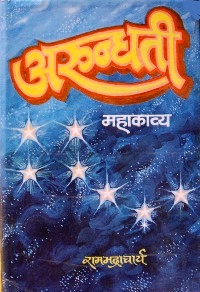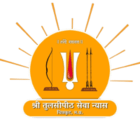Arundhatī – अरुन्धती
Arundhatī is a Mahākāvya (epic poem) in Hindi which was composed by Gurudeva during early 1990s Chitrakoot. The epic was published in 1994 by the Shri Raghav Sahitya Prakashan Nidhi, Haridwar. The book was released by the then President of India, Pandit Shankar Dayal Sharma, at his official residence in New Delhi. Through its narrative, the epic presents the sequence of psychological evolution of humans as the underlying theme. Steeped in morals, enriched in Bhakti and embellished with all the Rasas and figures of speech, the epic sings of the great values of Sanātana Dharma and the Vedic heritage of India. Arundhatī consists of 1280 verses, and is divided into 15 cantos (Sargas). The narrative of the seer-couple Arundhatī and Vasiṣṭha is drawn from various Hindu scriptures including Śiva Purāṇa, Śrīmadbhāgavatam, Vālmīkīya Rāmāyaṇa, Mahābhārata, Brāhmaṇa scriptures, Śrīrāmacaritamānasa, and Vinayapatrikā. Arundhatī, the eighth daughter of Ṛṣi Kardama and Devahūti, is married to Vasiṣṭha, the eighth mind-born son of Brahmā. Brahmā tells the seer-couple that they will have the Darśana of Śrīrāma. Arundhatī and Vasiṣṭha have one hundred sons and they live in Vasiṣṭha' Gurukula with the cow Kāmadhenu taking care of all their needs. The king Viśvaratha arrives in the Āśrama of Vasiṣṭha and is honoured by the seer. When Viśvaratha comes to know of Kāmadhenu, he beseeches Vasiṣṭha to give him the cow, which is turned down by Vasiṣṭha. Viśvaratha orders his soldiers to snatch Kāmadhenu by force, but Kāmadhenu producies armies of warrriors which annihilate the forces of Viśvaratha. Viśvaratha then fights Vasiṣṭha with divine arrows but all his arrows are fruitless against the Brahmadaṇḍa of Vasiṣṭha. Viśvaratha then decides that he has to achieve Brāhmaṇatva to defeat Vasiṣṭha. Viśvaratha performs a great penance to become Ṛṣi Viśvāmitra. Viśvāmitra's enance is interrupted by Menakā and Rambhā, and also by Triśaṅku's request to send him to Svarga in the human body. Viśvāmitra takes revenge on Vasiṣṭha and Arundhatī by cursing all of their hundred sons to die. The couple forgives this act of Viśvāmitra and beget another son Śakti, whose son is Parāśara. Viśvāmitra gets Śakti killed by a demon. Arundhatī and Vasiṣṭha again forgive Viśvāmitra who then apologizes and is then acknowledged as a Brahmarṣi by Vasiṣṭha. Arundhatī and Vasiṣṭha decide to enter the Vānaprastha phase of life after handing over all the duties of their Āśrama to their grandson Parāśara, but they are instructed by Brahmā to continue their Gārhasthya phase near Ayodhyā. Arundhatī and Vasiṣṭha build a new Āśrama near Ayodhyā where Vasiṣṭha is the Kulaguru of the Raghu race. Daśaratha is without a son and approaches Vasiṣṭha. Vasiṣṭha instructs Daśaratha to perform the Putreṣṭi fire-sacrifice with Ṛṣyaśṛṅga acting as the priest. Agni appears and offers a bowl of Caru to Daśaratha. Later Agni offers some Caru to Vasiṣṭha, unbeknownst to others. Lord Rāma, Bharata, Lakṣmaṇa, and Śatrughna are born to Daśaratha, while the Vyūha incarnation of Suyajña is born to Arundhatī and Vasiṣṭha. Suyajña is a dear friend of Lord Rāma and other princes, and they study together in the Āśrama of Arundhatī and Vasiṣṭha, where Arundhatī loves the Raghu princes like her own son. When the princes return to Ayodhyā, Viśvāmitra arrives and asks Daśaratha for Lord Rāma and Lakṣmaṇa to annihilate the demons troubling him. After securing Viśvāmitra's fire-sacrifice, the princes are taken by him to Mithilā where the marriage of mother Sītā with Lord Rāma takes place. When mother Sītā comes to Avadha, Arundhatī is the first to welcome her and converse with her. Kaikeyī forces Lord Rāma into a fourteen-year exile and after destroying Rāvaṇa, Lord Rāma returns to Ayodhyā with Lakṣmaṇa and mother Sītā. Upon their return to Ayodhyā, they have their first meal (Pāraṇa) at the Āśrama of Arundhatī and Vasiṣṭha in the presence of Suyajña. Download Arundhatī PDF(250 pages, 8.8 MB)॥ अरुन्धतीमहाकाव्यं कुर्वता शास्त्रचक्षुषा। विद्वांसो जीविताश्चैव मूर्खास्तुनिहता मया॥Composing the epic Arundhatī epic, the wise have been revived and the fools have been overwhlemed by me, whose eyes are the scriptures. - Gurudeva

‘अरुन्धती’ महाकाव्य एक नूतन वाङ्मयी प्रयाग है जिसमें तुलसीकृत ‘मानस’ स्थित ‘राम भक्ति’, ‘ब्रह्म विचार’ एवं ‘कर्मकथा’ रूप गंगा, सरस्वती और यमुना की धारायें हैं॥The epic Arundhatī is a new Prayāga in the field of literature, where there are the three streams of Gaṅgā in the form of Śrīrāma Bhakti, Sarasvatī in the form of the deliberation on Brahman, and Yamunā in the form of the narrative of Karmakathā (Pravṛtti). – Ramdev Prasad Singh
